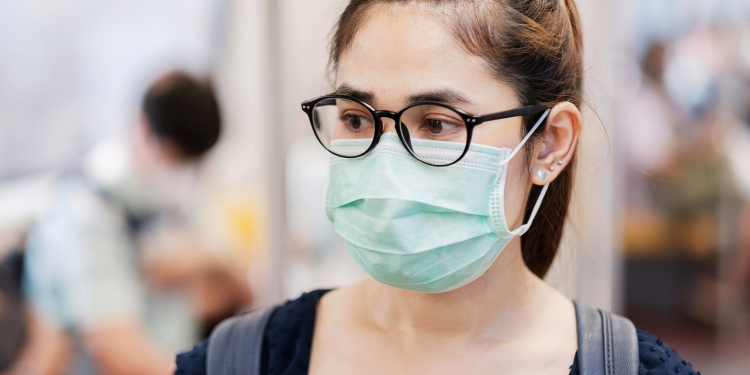The FINANCIAL — A recent study states that wearing glasses can lower the risk of coronavirus. Researchers from Suizhou Zengdu Hospital in Suizhou, China, claim that the use of eye protection, such as glasses, might offer some degree of protection from COVID-19. The team analyzed 276 patients who had coronavirus at a hospital in China’s Hubei province and they found out that only six percent wore glasses for more than 8 hours a day. On the other hand, 31.5 percent of the general population in Hubei wear glasses for the same time, indicating that wearing glasses could be protective against the coronavirus.
The subjects’ median age was 51 and included 155 men and 121 women, the authors reported in the study, published Wednesday in JAMA Ophthalmology. Medical professionals commonly wear goggles as part of full personal protective equipment, given that the eyes have been documented as a viral entry point. The novel coronavirus latches onto mucosa in the eyes as elsewhere in the body. The eyes, also like other areas of the body, contain ACE-2 receptors, it was noted, another coronavirus fave entry point, as NY Daily News reported.
In the study, published in JAMA Ophthalmology, the researchers, led by Weibiao Zeng, said that in this cohort study of patients hospitalized with COVID-19 in Suizhou, China, the proportion of inpatients with COVID-19 who wore glasses for extended daily periods (>8 h/d) was smaller than that in the general population, suggesting that daily wearers of eyeglasses may be less susceptible to COVID-19. However, other experts have warned that the findings should be taken with a pinch of salt, according to Mirror.
Their research suggests that hospital admissions among glasses-wearers were therefore over five times lower than what could be expected from the region. The team says this could be due to ACE-2 receptors in the eyes, which is an entry point for coronavirus to infect human cells. Often viral particles penetrate these points through contact with hands, which could include a person touching their mouth or rubbing their eyes. They stated that this could be due to glasses preventing or discouraging wearers ‘from touching their eyes, thus avoiding transferring the virus from the hands to the eyes’. The researchers also found that around 12% of coronavirus patients suffered from ‘ocular manifestations’, such as redness and swelling around their eyes. They said this could be further evidence the eyes are an ‘important channel’ for the virus, Metro wrote.
The current study, published in JAMA Ophthalmology, was accompanied by a commentary from Dr. Lisa Maragakis, an infectious disease specialist and associate professor of medicine at Johns Hopkins School of Medicine, who urged caution in interpreting the results. Dr. Maragakis noted that any number of factors could confound the data, and it may be that wearing glasses is simply associated with another variable that affects risk for Covid-19. For example, it could be that people who wear glasses tend to be older, and more careful and more likely to stay home during a viral outbreak, than those who do not wear glasses. Or perhaps people who can afford glasses are less likely to contract the virus for other reasons, like having the means to live in less crowded spaces, according to The New York Times.
The Centers for Disease Control and Prevention (CDC) recommends eye protection for a variety of potential exposure settings where workers may be at risk of acquiring infectious diseases via ocular exposure. This document provides background information and specific details on eye protection that can be used to supplement eye protection recommendations provided in current CDC infection control guidance documents. It is intended to familiarize workers with the various types of eye protection available, their characteristics, and their applicable use. Workers should understand that regular prescription eyeglasses and contact lenses are not considered eye protection.
It is also interesting to note that Scientists at the University of Pittsburgh School of Medicine claim they have discovered an antibody which “completely neutralizes” coronavirus in what could be a major breakthrough in the hunt for a cure. Researchers claim to have isolated ‘the smallest biological molecule’ that ‘completely and specifically neutralizes’ the virus that causes coronavirus. The drug is named Ab8 and is seen as a potential preventative against SARS-CoV-2.
A growing number of recovered coronavirus patients report hair loss. A Study Conducted by Dr. Natalie Lambert and Survivor Corps shows that 27% of patients recovering from COVID-19 reported hair loss as one of the lingering problems in a survey of more than 1,500 people. While CDC only identified 17 COVID-19 symptoms, the survey found 98 possible symptoms. However, hair loss may be tied to a condition called telogen effluvium. Read more.
Face shields became popular, but can they protect us from coronavirus?































Discussion about this post